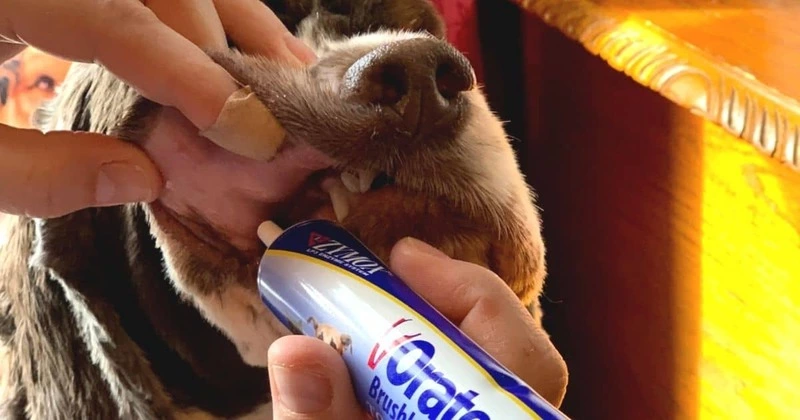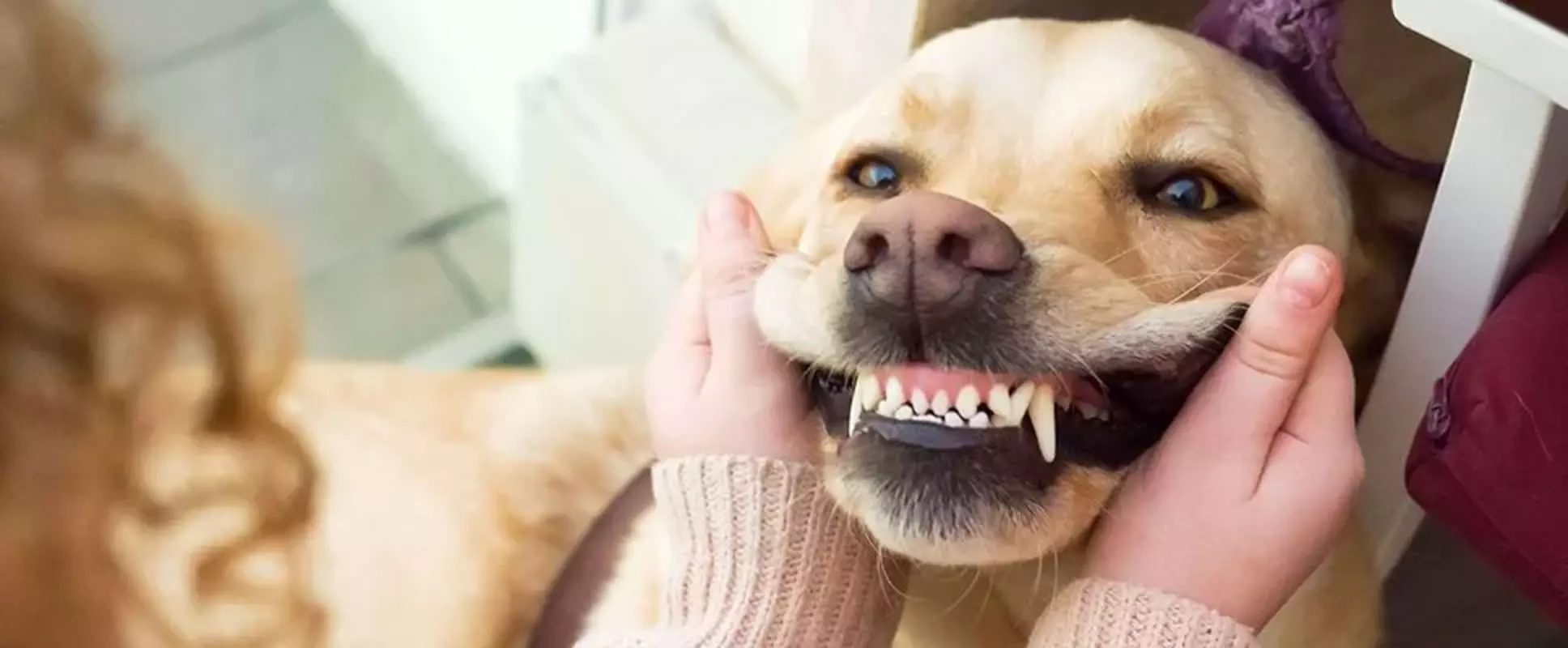One important question that many pet owners asked How To Clean Dog Teeth Without Brushing? Dental hygiene is just as important for dogs as it is for humans. Regular dental care is essential for maintaining good oral health in dogs, and it can also help prevent a range of health problems. However, not all dogs are fans of having their teeth brushed, and some pet owners may struggle to keep up with a daily dental routine. Fortunately, there are several alternative methods for cleaning a dog’s teeth without brushing.
Why You Should Clean Your Dog’s Teeth
There are several reasons why you should clean your dog’s teeth regularly:
Prevent dental disease:
Dental disease is one of the most common health problems in dogs, and it can lead to serious health issues if left untreated. Regular brushing can help prevent plaque and tartar buildup, which can lead to gum disease, tooth decay, and other dental problems.
Improve your dog’s overall health:
Dental disease doesn’t just affect your dog’s teeth and gums; it can also affect their overall health. Bacteria from the mouth can enter the bloodstream and cause infections in other parts of the body, such as the heart, lungs, and kidneys.
Save money on veterinary bills:
Regular dental cleanings and preventive care can help prevent more serious dental problems that may require expensive treatments, such as extractions or surgery.
Improve your dog’s breath:
Regular brushing can help freshen your dog’s breath and eliminate bad odors caused by dental disease.
Strengthen your bond with your dog:
Regular brushing can help strengthen the bond between you and your dog by providing a positive and relaxing experience for both of you.
It’s important to start brushing your dog’s teeth at a young age to get them used to the process, but it’s never too late to start. Talk to your veterinarian about the best way to brush your dog’s teeth and how often you should do it. With regular brushing and dental care, you can help keep your dog healthy and happy for years to come.
How To Clean Dog Teeth Without Brushing
How To Clean Dog Teeth Without Brushing? Cleaning a dog’s teeth without brushing can be a challenge, but there are a few methods that you can try:

1. Dental Chews:
Dental chews are a tasty way to promote dental hygiene in dogs. They work by scraping away plaque and tartar as your dog chews on them.
2. Dental Wipes:
Dental wipes are specially designed wipes that you can use to clean your dog’s teeth. They are easy to use and can help remove plaque and bacteria from your dog’s teeth and gums.
3. Dental Sprays:
Dental sprays are a liquid that you can spray into your dog’s mouth. They are designed to kill bacteria and freshen breath. Some sprays contain enzymes that break down plaque and tartar.
4. Water Additives:
Water additives are formulated to promote dental health in dogs. They can be added to your dog’s water bowl to help freshen breath and prevent plaque and tartar buildup.
5. Raw Bones:
Giving your dog a raw bone to chew on can help promote dental health. The act of chewing on the bone helps to scrape away plaque and tartar.
6. Dental Toys:
There are various dental toys available in the market that are designed to promote dental hygiene in dogs. These toys work by cleaning your dog’s teeth as they play with them.
7. Coconut Oil:
Coconut oil is a natural antibacterial agent that can help prevent plaque and tartar buildup. You can apply coconut oil to your dog’s teeth and gums using a soft cloth or cotton swab.
8. Apple Cider Vinegar:
Apple cider vinegar is another natural antibacterial agent that can help promote dental health in dogs. You can dilute apple cider vinegar with water and use it to rinse your dog’s mouth.
9. Diet:
Feeding your dog a healthy diet can also help promote dental health. A diet that is high in protein and low in carbohydrates can help prevent plaque and tartar buildup.
10. Professional Dental Cleaning:
If your dog’s teeth are severely dirty or they have existing dental problems, professional dental cleaning may be necessary. Your veterinarian can perform a dental cleaning under anesthesia to remove plaque and tartar buildup and address any dental issues.
It’s important to note that while these methods can be effective in promoting dental health, they are not a substitute for regular brushing. It’s still important to establish a dental care routine that includes daily brushing to ensure your dog’s teeth and gums stay healthy.
Does My Dog Need To Have Their Teeth Cleaned?

Yes, dogs really do need to have their teeth cleaned. Just like humans, dogs can suffer from a range of dental problems if their teeth and gums are not properly cared for. These problems can include plaque buildup, tartar, gum disease, and even tooth decay. If left untreated, these issues can cause pain, infection, and even tooth loss, which can impact your dog’s overall health and wellbeing.
Regular cleaning can help prevent these issues from occurring, as it helps to remove plaque and tartar buildup from your dog’s teeth. It also promotes healthy gums and can help prevent bad breath. Cleaning your dog’s teeth also provides an opportunity for you to check for any signs of dental problems, such as loose or broken teeth, swollen gums, or unusual bumps or growths in the mouth.
Signs of Dental Disease in Dogs
Here are some signs of dental disease in dogs to watch out for:
Bad breath: Bad breath is a common sign of dental disease in dogs. If your dog’s breath smells particularly foul, it could be a sign of an infection or other dental problem.
Discolored teeth: Healthy dog teeth should be white or light yellow. If you notice that your dog’s teeth are brown or black, it could be a sign of dental disease.
Loose or missing teeth: If your dog has loose or missing teeth, it could be a sign of advanced dental disease. Loose teeth can be painful and can affect your dog’s ability to eat and play.
Swollen or bleeding gums: Swollen or bleeding gums are a sign of gum disease, which is a common dental problem in dogs. If you notice that your dog’s gums are red, swollen, or bleeding, it’s important to have them evaluated by a veterinarian.
Difficulty eating or chewing: Dental disease can make it painful for dogs to eat or chew. If your dog is having difficulty eating, it could be a sign of dental disease.
Drooling: Excessive drooling can be a sign of dental pain or discomfort in dogs. If you notice that your dog is drooling more than usual, it’s important to have them evaluated by a veterinarian.
Pawing at the mouth: If your dog is pawing at their mouth, it could be a sign of dental pain or discomfort. It’s important to have them evaluated by a veterinarian to determine the underlying cause.
It’s important to note that many dogs will continue to eat and play normally, even if they have dental disease. That’s why it’s important to schedule regular dental checkups with your veterinarian to catch any dental problems early and prevent them from getting worse.
Cost of Professional Dog Dental Cleanings
The cost of a professional dental cleaning for a dog can vary depending on several factors, including the location, the size of the dog, the extent of dental disease, and the type of anesthesia used. Generally, the cost of a professional dog dental cleaning can range from $300 to $800 or more.
In addition to the cost of the cleaning itself, there may also be additional fees for pre-anesthetic blood work, antibiotics, pain medication, and tooth extractions if necessary. The cost of follow-up care, such as dental X-rays and ongoing dental maintenance, should also be considered.
It’s important to note that while the cost of a professional dental cleaning may seem high, it’s a necessary investment in your dog’s health. Untreated dental disease can lead to serious health problems, such as infections, abscesses, and even heart and kidney disease. By investing in regular dental cleanings and preventive dental care, you can help ensure that your dog stays healthy and happy for years to come.
Conclusion:
While daily brushing is the most effective way to maintain good oral health in dogs, not all pets are amenable to the practice. However, there are several alternative methods for promoting dental hygiene that pet owners can consider. Pet owners should work with their veterinarian to determine the best approach for their pet’s individual needs and lifestyle, but by incorporating these alternative methods, they can help ensure their furry friend’s teeth and gums stay healthy for years to come.
How can I clean my dog’s teeth naturally?
You can clean your dog’s teeth naturally by giving them chew toys, raw bones, fruits and vegetables, and coconut oil, which can help reduce plaque and freshen breath.
What is the easiest way to clean dogs teeth?
The easiest way to clean a dog’s teeth is by using dental wipes, dental sprays, or dental chews, which can help reduce plaque and freshen breath.
Is it OK to not brush your dog’s teeth?
While it’s not ideal, it’s possible for a dog to maintain healthy teeth and gums without regular brushing. However, regular dental care is still recommended.

3 thoughts on “How To Clean Dog Teeth Without Brushing? 10 Easy Methods”